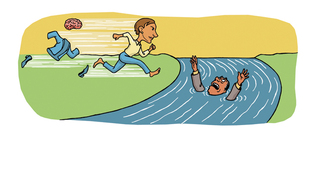 loading
loading
FindingsThe right stuffHeroism: it’s not something you stop to think about.  Gregory NemecView full imageSince its inception in 1904, the Carnegie Hero Fund Commission has awarded almost 10,000 medals to ordinary citizens who risked their lives to save others. But what makes a hero? Why will some people enter a burning building, try to disarm a knife-wielding assailant, or race to pull an accident victim from the path of an oncoming train—while others choose not to act? David G. Rand, assistant professor of psychology and director of Yale’s Human Cooperation Lab, asked more than 300 people to study newspaper, radio, and TV accounts of the heroism of 51 Hero Fund medal recipients. Last fall on PLoS One online, Rand and Ziv G. Epstein report that the subjects overwhelmingly rated the heroes as acting intuitively rather than with deliberation. A computerized text analysis came to the same conclusion. “Basically, these heroes act first and think later,” says Rand. “In such high-stakes, extreme situations, they go with their gut and avoid the pull of selfish rationalization.” In his research, which often uses several different laboratory games designed to test ideas about cooperation, Rand has developed a two-part explanation of heroism. “First, you must have the impulse to help, and second, be willing to act on that impulse to help and not think about it,” he says. “But that kind of intuitive cooperativeness is not necessarily hard-coded genetically. Rather, I believe that this intuition comes from daily life experiences in which helping is typically successful behavior.” Your upbringing can make a difference, he suggests, as can military training or religious principles. “In this sense, altruists are more made than born.”
The comment period has expired.
|
|